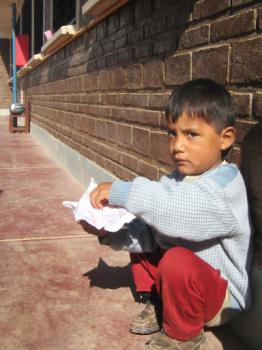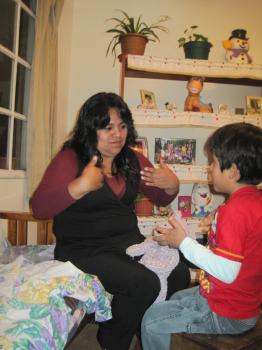Intensive and rapid urbanisation translates into a precarious life for many families

SOS Children’s Village Cochabamba-Tiquipaya (previously known as SOS Children’s Village Tiquipaya) is located just ten kilometres from the city of Cochabamba at an altitude of 2,649 metres above sea level. In the past two decades, its population has increased more than tenfold and is currently over 30,000, making it Bolivia’s fastest growing town. Around 58 per cent of the population here speak Quechua.
The steady influx of migrants was due, in part, to the closing of many mines in rural areas. Migrant families arrived in search of work and a better life. However, the disorganised nature of this intensive urbanisation has led to severe environmental problems and overcrowding. Most people don’t own the land they live on, their homes are improvised constructions that are not very safe, and they lack basic services such as clean water, sewage or waste removal systems. Basic urban infrastructure, including schools and hospitals, is also not available to all. Land that was traditionally used for agriculture is now being used for residential purposes and Tiquipaya, once known as the “city of flowers”, has hardly any green spaces left.
These conditions do not make for a safe and nurturing environment for children to grow up in. Many migrants are unable to find formal work when they arrive in their new hometown and often children are forced to work, for example shining shoes, to improve the family’s income. They are thus deprived of a proper education and are exposed to the dangers of the street.
Helping the next generation break the cycle of poverty
The government of Evo Morales has endeavoured to improve the situation of the poor in Bolivia and has made great inroads towards including the indigenous population in economic processes. However, many children still have little hope of breaking the cycle of poverty unless they receive appropriate education that will allow them to take up a profession in later life. SOS Children’s Villages began its efforts in Tiquipaya with a focus on helping young people attain formal employment and improve their situation.
What we do in Cochabamba-Tiquipaya

Our work in Tiquipaya began in 1974.
Strengthening families: The social centres in Tiquipaya are run by local families and offer a holistic and sustainable family strengthening programme that aims to alleviate hardship in the local community. It offers a day-care centre and childminding, which makes it possible for parents to leave their children in safe hands while they go out to make a living.
Care in families: For children in the region who are no longer able to live with their parents, there are 14 SOS families where up to 126 children can find a loving home. They live with their brothers and sisters and are affectionately cared for by their SOS mothers.
Training and support for young people: There is a vocational training centre where up to 83 young people receive training in bakery, dressmaking, computer repair and other professions. Shared housing is also made available to young people currently in training, where qualified counsellors support them in becoming independent adults.